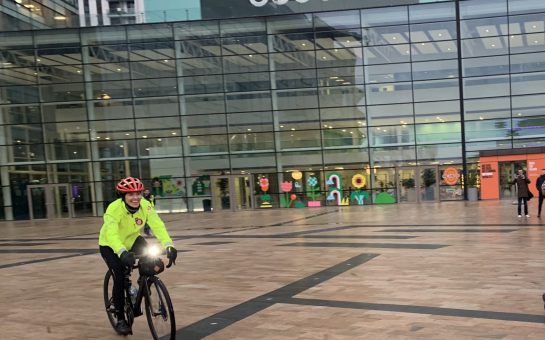More than 7000 carers are putting their health at risk by working in excess of 100 hours per week, Salford City Council have warned.
Around 23,000 people in Salford identify themselves as carers, saving local public services an estimated £437 million every year.
The counil say more than a third of this figure are risking their own health by working 100 hours a week or more.
Despite the huge number of carers who have identified themselves,only 4,000 carers are known to support services and organisations in the city.
Salford resident Sarah gave up her retail job to become a full-time carer after her mother-in-law Noreen, now 79, suffered a stroke two years ago.
“It’s hard to pinpoint how many hours a week I do because it varies but it’s family,” she said.
“You just do it. I’m at Noreen’s home morning, afternoon and in the evenings because she needs help with everyday tasks, sorting out appointments and shopping.”
Sarah does getsome support, from her husband Mike, a sales rep. The pair often have to tend to Noreen during the middle of the night.
It’s been a strain for the whole family since Noreen suffered her stroke.
Sarah said: “When Noreen first came out of hospital we had daily medical and therapy appointments and she had to relearn how to do so many simple tasks.
“I was dealing with all that, running my home and hers, looking after my family and trying to walk the dogs – sometimes I didn’t even have time to make my own doctor’s appointment but Noreen is improving so things are easier now.”
A survey carried out by the council in 2012 found that of the 600 plus carers who responded, 47% were retired and 22% were not working due to their commitments.
Nearly half of carers admitted to working more than 50 hours per week, with 37% saying they did more than 100 hours per week.
Only one in five said they were able to spend any time doing what they enjoyed and only 60% said they were able to look after themselves properly, including getting enough sleep.
Janet Riley, manager of Salford Carers Centre knows the struggle carers often have when looking after people.
“Carers are super – but not super-human and they can risk their own health and well-being by trying to do it all alone,” Janet said.
“We’re here to say there is help, come forward and we can give you information, practical advice and support on everything from health concerns and emotional needs to money and equipment which can help make things easier.”
Now the council and Salford Clinical Commissioning Group (CCG) are launching an updated Carers Strategy to encourage more carers to come forward for information, advice and support.
Salford City Mayor Ian Stewart said: “Carers do fantastic work and we cannot thank them enough.
“They are the unsung heroes and heroines of Salford and many of them ‘just get on with it’ without ever seeking help and support, putting their own health and wellbeing at risk.
“We can’t let carers continue to run themselves into the ground and we need carers to come forward and find out how we, as a city, can help them as much as possible – even in the face of government spending cuts.
“And we need everyone in the city, from employers to the general public, to recognise the importance of carers and give them our support.”
Both Salford council and the NHS have worked to identify and support carers offering them a range of services over the last four years.
These include training programmes, more flexible respite breaks, free health checks, cut price leisure passes, specialist services and more information about a wide range of community support as well as supporting Salford Carers Centre.
The new strategy will continue this work and maintain the current joint spend of £900,000 a year.
Dr Jenny Walton, Clinical Lead at Salford CCG and GP at the Lakes Medical Centre in Swinton, believes it must be a priority that carers are identified.
“Staff in GP practices across Salford invest a considerable amount of time identifying and recording whether any patients have carer duties,” she said
“Once we know who these carers are, we make sure that we can give them additional support to ensure that they look after their own health as well as those they care for.”
Image courtesy of Eileen Kennedy, via YouTube, with thanks.



